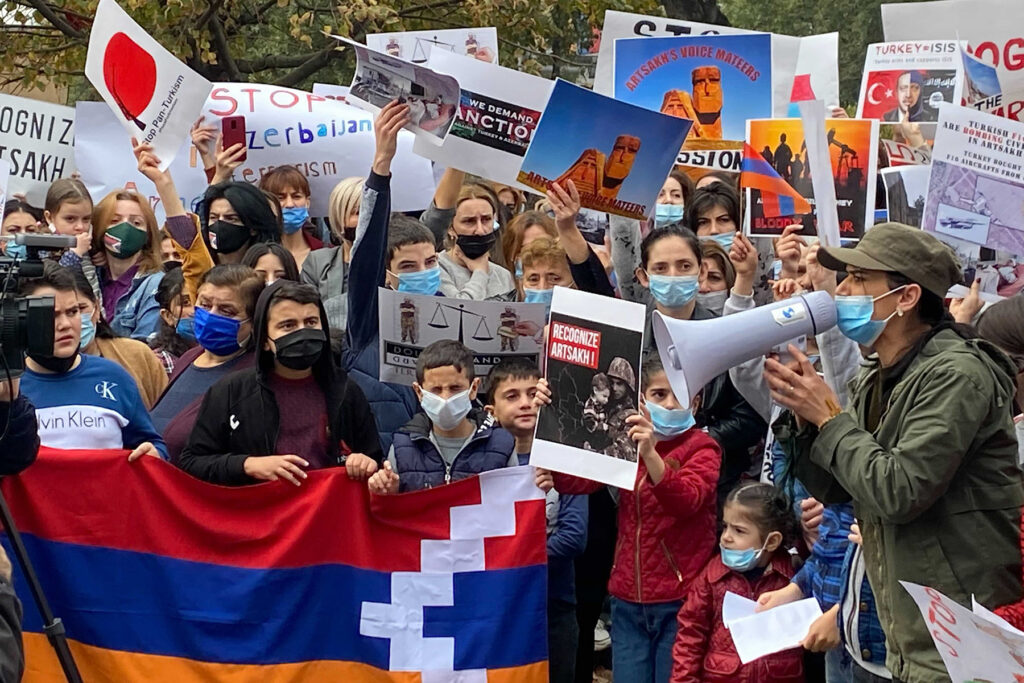Refugees displaced by the war in Nagorno-Karabakh have held a series of demonstrations in front of the US and UK embassies as well as the EU and UN missions in Armenia.
Almost 1,000 women and children gathered on Monday in front of the American Embassy calling for US recognition of Nagorno-Karabakh as an independent state. They also called on the US to sanction Turkey and Azerbaijan and send humanitarian assistance for those forced to flee the conflict.
The authorities in Nagorno-Karabakh have said that around 60% of the population has fled their homes because of the current fighting. Azerbaijanis from some of the towns near the frontline have also reportedly been displaced.
Monday’s protest was the second unsuccessful attempt by protesters to meet with US Ambassador Lyne Tracy, who was reportedly not in the building. A previous protest took place on 22 October. Embassy staff told the protesters they were unsure if a meeting could be arranged.
The protesters announced that they would stay in front of the Embassy until Ambassador Tracy met with them. On Monday evening, they were conducting a sit-in which was ongoing.
One of the organisers, Siranush Sargsyan, told OC Media she could not understand why the US diplomat was avoiding meeting with them.
According to Sargsyan, who sits as an expert on the Education Committee of Nagorno-Karabakh’s parliament, 90,000 people have been displaced by the war and 24,000 children no longer have access to education.

‘They say Nagorno-Karabakh is not a recognised state, but they are still obliged to help us’, said Sargsyan.
‘There’s a humanitarian crisis happening, an ecological crisis taking place in Nagorno-Karabakh [due to forest fires allegedly started by Azerbaijani forces], we’re in the midst of a pandemic. [Diplomatic representatives] always provide help in these kinds of circumstances to other countries. Why should we be any different?’
Sargsyan said she also wanted the Armenian government to be more active in demanding international humanitarian support and aid for families from Nagorno-Karabakh.
A fifth demonstration
Monday’s demonstration was the fifth protest organised by the refugees in front of international representative bodies. The organisers have called this initiative ‘Artsakh’s Voice Matters’.
‘Our main aim is to make the international community wake up through the voices of our women and children’, one of the group’s statements reads. ‘And force them to take precise and clear steps against Turkish-Azerbaijani terrorism.’
The first protest took place in front of the UN office in Yerevan on 19 October. UN Resident Coordinator Shombi Sharp met with the organisers of the initiative.
Irina Safaryan, one of the organisers and assistant to the chair of Nagorno-Karabakh’s parliament, told OC Media that Sharp did voice concern over the humanitarian crisis which has emerged due to the war.
However, she said he had made it clear they could not provide assistance due to the Nagorno-Karabakh not being recognised by any state.
Another protest took place in front of the offices of the European Union Delegation in Armenia on 26 October. Ambassador Andrea Wiktorin also met with the organisers of the protest.
According to the protesters, Wiktorin informed them that she would send their demands to Brussels. They said she had admitted that any sanctions against Turkey would take time.
On 29 October, the group protested in front of the UK Embassy in Yerevan. They accused the UK of putting oil interests above national interests and criticised BP for publicly supporting Azerbaijan’s territorial integrity.
The UK Ambassador was also reportedly absent from the building that day, and protesters left ‘bottles of oil,’ several ‘bloody’ manats along with a letter addressed to UK Chargé d’Affaires Helen Fazey.
For ease of reading, we choose not to use qualifiers such as ‘de facto’, ‘unrecognised’, or ‘partially recognised’ when discussing institutions or political positions within Abkhazia, Nagorno-Karabakh, and South Ossetia. This does not imply a position on their status.




 2 November 2020
2 November 2020



